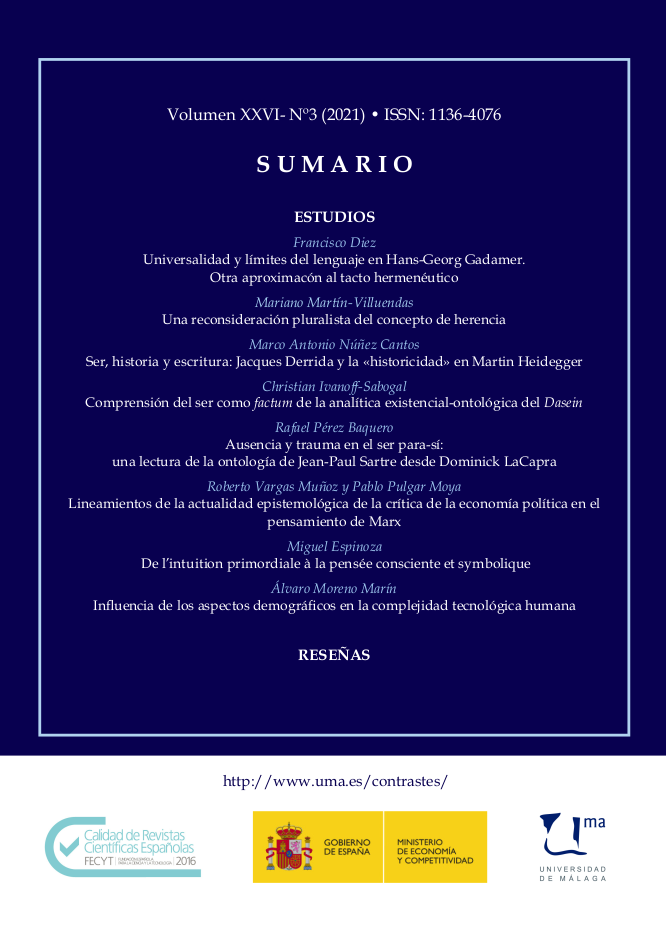Universality and limits of language in Hans- Georg Gadamer. Another approach to hermeneutical touch
DOI:
https://doi.org/10.24310/Contrastescontrastes.v26i3.10171Keywords:
tact, limits, hermeneutics, phenomenonAbstract
The aim of the paper is to examine the limits of the phenomenon of understanding and language in relation to the universality claims of Gadamer's hermeneutics from the perspective of his virtue of tact. Tact is "the supreme virtue of the true interpreter" (Gadamer GW 9, 442) who knows how to deal with the infinity of the text within the limits of the hermeneutical situation. In the description of this virtue there appear features of the tactile perceptual sense that must be examined. His analysis seeks to clarify the pre-predicative foundations of the limits and universality of Gadamer's hermeneutics.
Downloads
Metrics
Publication Facts
Reviewer profiles N/A
Author statements
Indexed in
-
—
- Academic society
- N/A
- Publisher
- Universidad de Málaga
References
H.-G. Gadamer, “Wahrheit und Methode”, Gesammelte Werke 1, Tübingen: M. Siebeck, 1990.
H.-G. Gadamer, “Wahrheit in den Geisteswissenschaften” (1953), Gesammelte Werke 2, Tübingen: M. Siebeck, 1993, pp. 37-43.
H.-G. Gadamer, “Die Natur der Sache und die Sprache der Dinge” (1960), Gesammelte Werke 2, pp. 66-76.
H.-G. Gadamer, “Rethorik, Hermeneutik und Ideologiekritik. Metakritische Erörterungen zu ‘Wahrheit und Methode’” (1967), Gesammelte Werke 2, pp. 232-250.
H.-G. Gadamer, “Vorwort zur 2. Auflage” (1965), Gesammelte Werke 2, pp. 437-448.
H.-G. Gadamer, “Stimme und Sprache” (1981), Gesammelte Werke 8, Tübingen: M. Siebeck, 1993, pp. 258-270.
H.-G. Gadamer, “Die Vielfalt der Sprachen und das Verstehen der Welt” (1990), Gesammelte Werke 8, pp. 339-349.
H.-G. Gadamer, “Grenzen der Sprache” (1985), Gesammelte Werke 8, pp. 350-361.
H.-G. Gadamer, “Wer bin Ich und wer bist Du?” (1986), Gesammelte Werke 9, Tübingen: M. Siebeck, 1993, pp. 383-452.
H.-G. Gadamer, “Europa und die Oikoumene” (1993), GW 10, Tübingen: M. Siebeck, 1995, pp. 267-286.
H.-G. Gadamer, “Über das Hören” (1998), Hermeneutische Entwürfe, Tübingen: M. Siebeck, 2000, pp. 48-55.
H.-G. Gadamer, “Vom Wort zum Begriff”, Jean Grondin (Hg.), Gadamer Lesebuch, Tübingen: M. Siebeck, 1997.
K. Gjesdal, Herder’s Hermeneutics. History, Poetry, Enlightenment, Cambridge: University Press, 2017.
J. Habermas, “Der Universalitätsanspruch der Hermeneutik”, Hermeneutik und Ideologiekritik, Frankfurt a M.: Suhrkamp, 1971.
M. Heidegger, “Vom Wesen der Sprache. Die Metaphysik der Sprache und die Wesung des Wortes. Zu Herders Abhandlung ‘Über den Ursprung der Sprache’”, I. Schüßler (Hg.), Gesamtausgabe 85, 1999, XII, Vittorio Klosterman.
H. von Helmholtz, “Über das Verhältniss der Naturwissenchaft zur Gesammtheit der Wissenschaften”, Vorträge und Reden I, Brunswick: Friedrich Vieweg, 1896.
J. G. von Herder, “Plastik”, Herders Sämmtliche Werke: Plastik; Vom Erkennen und Empfinden der menschlichen Seele, Vol. 8, Weidmann, 1892.
J. G. von Herder, “Zum Sinn des Gefühls”, J. Brummack, M. Bollacher (Hg.) Schriften zu Philosophie, Literatur, Kunst und Altertum 1774-1777, Tomo 4, Frankfurt am M.: Deutscher Klassiker, 1994.
J. G. von Herder, “Ist die Schönheit des Körpers ein Bote von der Schönheit der Seele?”, en U. Gaier u.a. (Hg.) Johann Gottfried Herder. Werke, Tomo 1, Frankfurt am M., 1985.
?J. G. von Herder, Abhandlung über den Ursprung der Sprache, Stuttgart, Reclam, 1997.
H. D. Irmscher, “Grundzüge der Hermeneutik Herders”, en J. G. Maltusch (Hg.) Bückeburger Gespräche über Johann Gotfried Herder 1971, Bückeburger, 1973.
P. Karczmarczyk, Gadamer: aplicación y comprensión, Buenos Aires: La Plata, Edulp, 2007.
M. Komel, The Language of touch. Philosophical Examinations in Linguistics and Haptic Studies, MIT, 2019.
J. Müller, Handbuch der Physiologie des Menschen, Coblenz: J. Hölscher, 1838, 40, 2:2.
Rodríguez Barraza, “Percepción y lenguaje: Herder o la vanguardia de la hermenéutica”, Contrastes. Revista Internacional de Filosofía, vol. XIII (2008), pp. 61-78.
S. Sikka, “Herder on the relation between language and world”, History of Philosophie Quarterly, Vol. 21, N° 2, April 2004, pp. 183–200.
J. G. Steinbuch, Beytrag zur Physiologie der Sinne, Nürnberg: L. Schrag, 1811.
J. Trabant, “Herder’s Discovery of the Ear”, en K. Mueller Vollmer (Hg.), Herder Today, De Gruyter, 1990, pp. 345-366.
U. Zeuch, Umkehr der Sinneshierarchie. Herder und die Aufwertung des Tastsinns seit der frühen Neuzeit, Tübingen, De Gruyter, 2000.
Downloads
Published
How to Cite
Issue
Section
License
This journal provides immediate free access to its content under the principle of making research freely available to the public. All content published in Contrastes. Revista Internacional de Filosofía, are subject to the Creative Commons Attribution-NonCommercial-ShareAlike 4.0 license whose full text can be found at <http://creativecommons.org/licenses/by-nc-sa/4.0>
It is the responsibility of the authors to obtain the necessary permissions of the images that are subject to copyright.
Authors whose contributions are accepted for publication in this journal will retain the non-exclusive right to use their contributions for academic, research and educational purposes, including self-archiving or repository in open access repositories of any kind.
The electronic edition of this magazine is edited by the Editorial Service of the University of Malaga (Uma Editorial), being necessary to cite the origin in any partial or total reproduction.










5.png)
